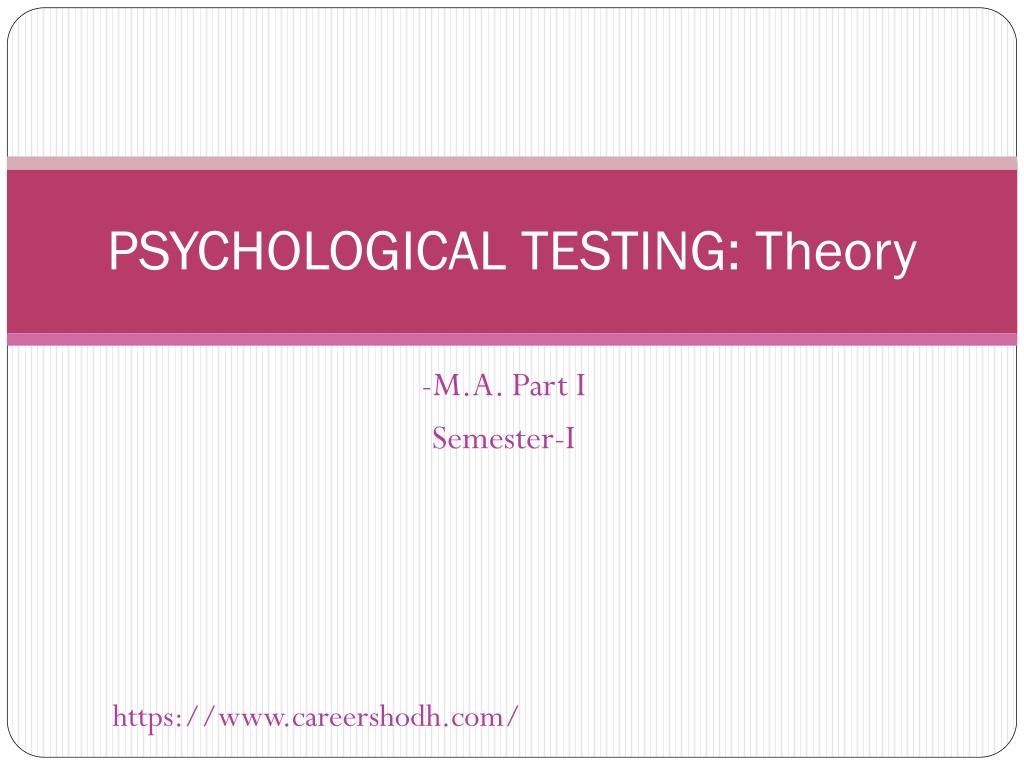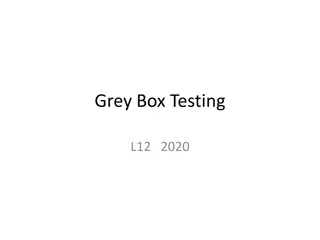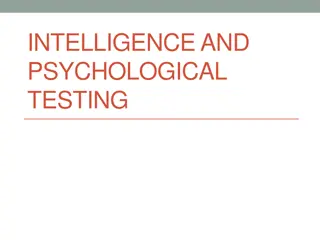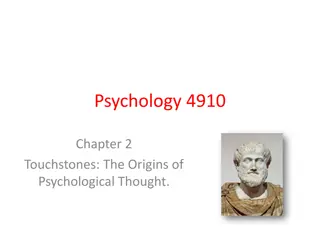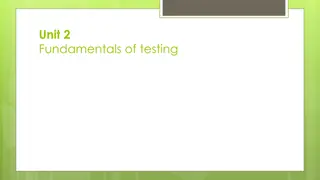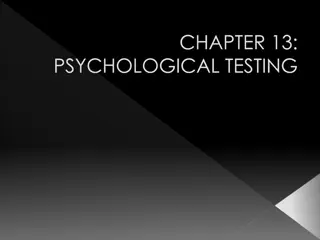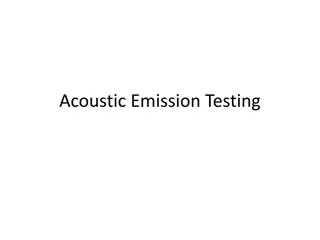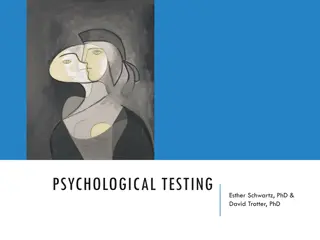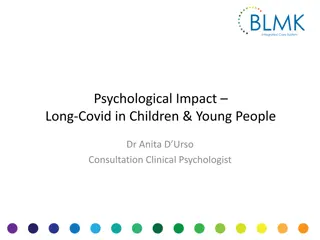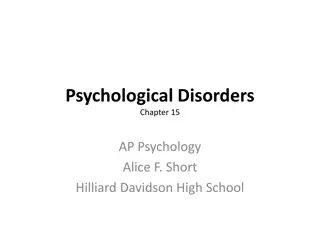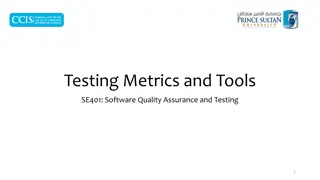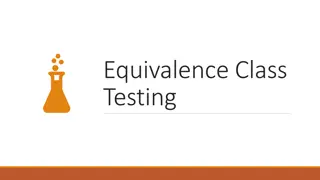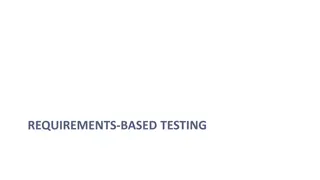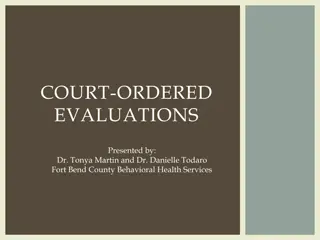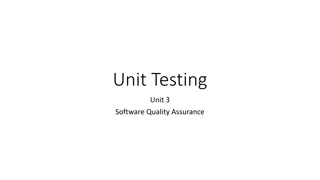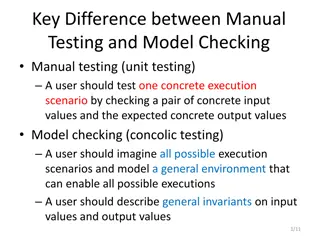Evolution of Psychological Testing: From Ancient Methods to Modern Applications
Delve into the historical journey of psychological testing, exploring its roots in ancient China and Greece, through the establishment of standardized testing systems in the 19th century, to the contributions of key figures like Francis Galton and Charles Spearman. Learn about the development of psychometric theory, test construction principles, and the evolution of intelligence testing methods.
Download Presentation

Please find below an Image/Link to download the presentation.
The content on the website is provided AS IS for your information and personal use only. It may not be sold, licensed, or shared on other websites without obtaining consent from the author. Download presentation by click this link. If you encounter any issues during the download, it is possible that the publisher has removed the file from their server.
E N D
Presentation Transcript
PSYCHOLOGICAL TESTING: Theory -M.A. Part I Semester-I https://www.careershodh.com/
OBJECTIVES: OBJECTIVES: 1. To acquaint them with the characteristics of standardized tests. 2. To familiarize the students with psychometric theory and principles of test construction. https://www.careershodh.com/
Chap 1. NATURE AND SCOPE OF Chap 1. NATURE AND SCOPE OF PSYCHOLOGICAL TESTING PSYCHOLOGICAL TESTING By Balaji Niwlikar https://www.careershodh.com/
Background Sophistry field of debate , questioning Protegeras proposed word Thesis . antithesis, synthesis Hypo- below . Epistemology- how to get knowledge ,branch of philosophy. Scientific method observable, measureable, verifiable . First large-scale mental testing were in China. Ancient Greeks used tests for educational processes. https://www.careershodh.com/
Background In 19th century ,USA and Europeans established many social institution for taking care of MR persons. They needed objective system to classification. French physician Esquirol provided the continuum the mentally retarded person . Seguin -1st schools for MR in France. Seguin Form Board inserting various shaped blocks in to corresponding recesses as quick as possible. https://www.careershodh.com/
Background Wundt at Leipzig in 1879 . Francis Galton o Launched testing movement . o Coined the terms psychometrics . o In 1884, Anthropometric laboratory visitors could measure certain physical traits vision reaction time. o Galton Bar (vision ), Galton Whistle (highest audible pitch) o Rating Scales ,Questionnaire , used Free Association Techniques o Developed a method for measuring intelligence based on nonverbal sensory-motor tests. o Developed Pearson product-moment correlation coefficient( Pearson's r) with Karl Pearson . https://www.careershodh.com/
Background James Cattell Experimental psychology. In 1980, coined mental test individual tests for measuring muscles strength , speed of movement ,memory, reaction time A. Binet Binet-Simon Scale -IQ Modern influences Charles Spearman Foundation of psychometric testing Theory of multiple intelligences(Gardner ) -G factor, S factor, used factor analysis. Spearman's rank correlation coefficient or Spearman's rho https://www.careershodh.com/
Robert S. Woodworth Woodworth Personal Data Sheet (WPDS), -first personality test.- neurotics Vs emotional stability . WWI . Henry Murrey TAT Hermann Rorschach Freudian psychiatrist , objective projective test https://www.careershodh.com/
Basic Concepts: Basic Concepts: What is measurement? Measurement is defined as assignment of numerals to objects or events according to some rule. (Stevens, 1946) It consists of rules for assigning numbers to objects in such a way as to represent qualities of attributes.(Nunnally,1970) What is Psychological Measurement? It is assignment of numerals to characteristics or attributes of individual according to rules.(Brown, 1987) https://www.careershodh.com/
What is a test? Critical examination, observation or evaluation. To use a set of questions or problems to measure someone's skills, knowledge, or ability . It is a systematic procedure for observing a person s behaviour and describing it with the aid of a numerical scale or a category system.(L.J. Cronbach) What is Psychological Test? It is a standardised and objective technique / tools of eliciting and assessing a sample of behaviour. It is the test that assesses person s abilities, aptitudes, interests or personality based on systematically obtained sample of behaviour.(Rea,2001) https://www.careershodh.com/
Characteristics of a Good Test : Characteristics of a Good Test : Uniformity: Itrefers to uniformity of administration and scoring. This feature is mainly required for intelligence, aptitude and personality tests. To establish uniformity researcher try to form an objective scoring key. This particular characteristic is a limitation for Projective tests. Objective administration and scoring results in minimal errors hence results of the test are more valid. Personal biases and limitation are taken care of to make results more accurate. EX .Intelligence test ,Aptitude test https://www.careershodh.com/
Characteristics of a Good Test : Characteristics of a Good Test : Objective Measurement: It refers to the objective measurement of discrimination and/or difficulty index. Items in the tests should be having moderate level of difficulty. E.g. In a Maths test if all the problems are difficult it would be difficult to judge the students because nobody will get good marks, vice a versa if all the problems are easy everybody will get good marks. Hence in both the cases judgement of the students and discriminating them into categories will be difficult. Discrimination index is used in personality tests where there is no difficulty but individuals are discriminated on the basis of the their attributes and characteristics. https://www.careershodh.com/
Characteristics of a Good Test : Characteristics of a Good Test : Comprehensiveness: Comprehensiveness refers to inclusion of various functions related to the topic of the test. Hence a test should comprehended the data and should have a relevant content in it. E.g. A primary school maths test should include all the mathematical functions which children may have already learnt and not only the selected functions. https://www.careershodh.com/
Characteristics of a Good Test : Characteristics of a Good Test : Psychometric Properties: A sound psychological test must have 3 psychometric properties including all of the following: Reliability - Obtaining the same result after multiple testing Validity- must measure what it is intended to measure. Norms- The average test score , to compared to the results of others by establishing a point of comparison or frame of reference. https://www.careershodh.com/
Types of Psychological Tests: based on content Tests for occupational setting Tests for special setting Tests for educational setting Achievement Test Tests for clinical setting Intelligence Test Psychological Tests Standardised achievement Test Personality Test Teacher made Achievement test Motivation, Interest, Value, Attitude Tests Special Aptitude Test Aptitude test General Aptitude Test https://www.careershodh.com/
Types of Psychological Tests: Psychological test Nature & content of the items No. of trait Assessed Administration Criterion Standardization Time Limit Scoring Power Test Speed Test Teacher made test Standardised Test Individual Tests Group Test Trait Specific Test Omnibus Test Objective Test Subjective Test Non Verbal Test Non Performa nce Test Verbal test Language Test https://www.careershodh.com/
Types of Psychological Tests Types of Psychological Tests Psychological tests Instruments used to measure specific constructs. Psychologists use these tests to help them to provide an accurate diagnosis for a client. Career counselors, educators, counselors and other mental health professionals also use them. There are many types of psychological tests based on different criterion. Intelligence tests Personality tests Attitude tests Achievement tests Aptitude tests Neuropsychological tests Vocational tests Direct observation tests Specific clinical tests Etc. https://www.careershodh.com/
Types of Psychological Tests: Intelligence tests -to measure intelligence, or your ability to understand your environment, interact with it and learn from it. Intelligence tests include: Group SPM, Cattell s Culture-fair Test of Intelligence Individual tests- Binet - Kamath test, Malin s Intelligence Scale for Indian Children (MISIC) Stanford-Binet Intelligence Scale (SB) Wechsler Adult Intelligence Scale (WAIS) Wechsler Intelligence Scale for Children (WISC) https://www.careershodh.com/
Types of Psychological Tests: Personality tests -to measure personality style and traits. Personality tests are commonly used in research or to assist with clinical diagnoses. 16 PF, NEO-PI R, EPQ-R Woodworth Personal Data Sheet Minnesota Multiphasic Personality Inventory (MMPI) Thematic Apperception Test (TAT) Rorschach, also known as the 'inkblot test' https://www.careershodh.com/
Types of Psychological Tests: Attitude tests to assess an individual's feelings about an event, person, or object. Attitude scales are used in marketing to determine individual (and group) preferences for brands, or items. The Likert Scale or the Thurstone Scale, Ex 1) Attitude scale towards family planning Hakim Singh 2) Attitude Interest Scale Terman & Miles 3) Modernization Scale- Rooma Pal Achievement tests -to measure how well you understand a particular topic (i.e., mathematics achievement tests). Wechsler Individual Achievement Test (WIAT) Peabody Individual Achievement Test ( PIAT) Aptitude tests to assess the potential of person . Differential Aptitude Test (DAT) Bloomberg Aptitude Test (BAT) Armed Services Vocational Aptitude Battery (ASVAB) https://www.careershodh.com/
Types of Psychological Tests: Vocational tests, /career tests / occupational tests, -to measure your interests, values, strengths and weaknesses. To determine which careers or occupational settings you are most suitable for by Career psychologists and counselors To help clients make decisions about their future educational goals and career choices. Jackson Vocational Interest Survey (JVIS) Strong Interest Inventory (SII) Direct observation tests are measures in which test takers are observed as they complete specific activities. It is common for this type of test to be administered to families in their homes, in a clinical setting such as a laboratory or in a classroom with children. : Parent-Child Interaction Assessment-II (PCIA-II) MacArthur Story Stem Battery (MSSB) Dyadic Parent-child Interaction Coding System-II (DPICS II) https://www.careershodh.com/
Types of Psychological Tests: Neuropsychological tests -to detect impairments in your cognitive functioning that are thought to be a result of brain damage. For example, if you were to have a stroke, you might have a neuropsychological test to see if there is any resulting cognitive damage (i.e., decreased ability to think due to damage in a brain pathway). The Halstead-Reitan Neuropsychological Test Battery. Wisconsin Card Sorting Test (WCST) Benton Visual Retention Test (BVRT) https://www.careershodh.com/
Types of Psychological Tests: Specific Clinical tests - measure specific clinical constructs, such as anxiety or PTSD. Beck Depression Inventory (BDI) Beck Anxiety Inventory (BAI) Hopelessness Scale for Children (HSC) https://www.careershodh.com/
Uses of Psychological Test: Test helps in measuring human behaviour. It helps in evaluation purpose. E.g. Achievement Test It helps to monitor learning process. ( for students, workers ,etc.) It helps in educational guidance. It helps in counselling programs. To understand group behaviour tests are useful. In diagnostic purpose tests are the reliable aids.(which therapy & et) In Assessment centres . In IO psychology Test helps in Personnel selection, recruitment and to screen interests of the employees. In Defence-selection, situational tests. https://www.careershodh.com/
General Steps in Test Construction: Conceptualization Selection of Population Item writing Reliability Assessment Validity & Norms Assessment https://www.careershodh.com/
General Steps in Test Construction: Conceptualization- Concept - Anxiety , Tension ,Worry, Neuroticism ,etc. Clear ,working and operational definition of Neuroticism. Which aspect will have how much weight . Should aware of latest data and critical approaches. 2. Population Deciding population - age ,gender, occupation ,socio- economic status, etc. For standardization of test . 3. Item Writing Process should involve experts and team also. Conceptualization of each domain & writing down the items accordingly . https://www.careershodh.com/ 1.
General Steps in Test Construction: Reliability Assessment To check consistency of scores. Different methods . Test should be administered to a large sample . Validity & Norms Assessment To check, is it assessing what it claims ? Different types . To compare other position in general population. 4 5 https://www.careershodh.com/
Issues in Test Administration : Ethics Qualification of the test user. If the test owner is selling the test to any institution , should be ensured about the qualification of the test users from institute. Personal training should be given to test administration of projective tests like Rorshach. Publisher of the test should be responsible for standardization of the test as well as if all the material is provided or not. Security issues related to the test should be well maintained. Consent of the subject is important, especially for situational test. Confidentially should be well maintained for the test. Single administration is preferred in test administration. 1. 2. 3. 4. 5. 6. 7. 8. https://www.careershodh.com/
Issues in Test Administration : Ethics Issue of Xeroxing should be carefully handled. 9. 10. Test taker should get rough nature of the test. 11. Scoring of the test should be done as per the manual. https://www.careershodh.com/
Issues in Test Administration : Bias Should not be biased about Caste or socio-cultural factors. Cultural factors Genuine differences could be there but biases should not be there. Construct bias- construct has different meaning in different groups. Predictive bias- Administrative Bias Scorer/ Interpreter Bias 1. 2. 3. 4. https://www.careershodh.com/
Issues in Test Administration : cultural fairness Comparison of two cultural groups . Try to avoid cultural differences To cover most cultures . Minimum use of language . Use of a tools that will be applicable /accessible in most cultures. Ex. SPM, Woodeno & Harris Test, Cattell Culture Fair Intelligence test (CFIT),etc. https://www.careershodh.com/
[B] Factors influencing test performance- Examiner Age ,gender, ethnicity, training- are imp . Situational variables Characteristics of test ,relax, non-threatening situation except test which demands stress . Test-taker s perspective Anxiety , mental disordered person 1. 2. 3. https://www.careershodh.com/
THANK YOU Find more study material on https://www.careershodh.com/ And share with others. https://www.careershodh.com/
